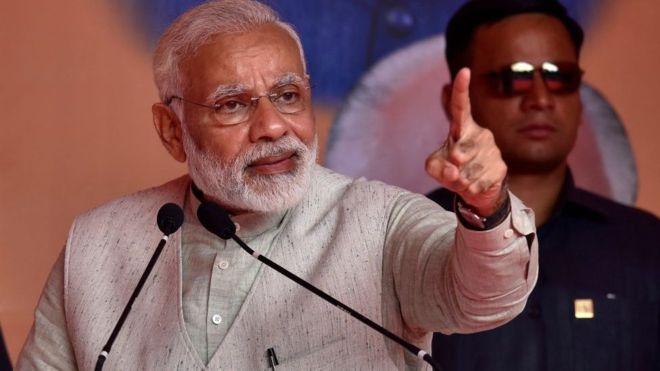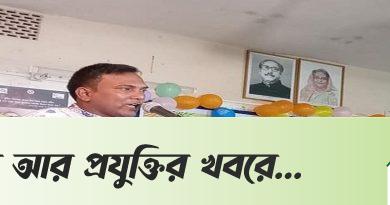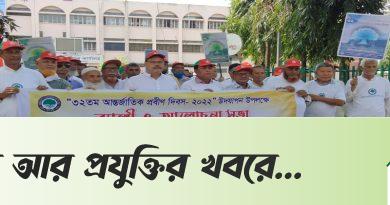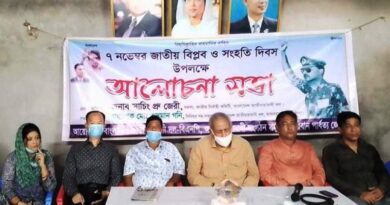Modi says India now a ‘space power’
India has entered full election mode: voting is due to begin on 11 April, with the final ballot cast more than five weeks later on 19 May. Every day, the BBC will be bringing you all the latest updates on the twists and turns of the world’s largest democracy.
PM Modi’s ‘big’ announcement
What happened?
Prime Minister Narendra Modi made an unexpected address to the nation on Wednesday.
He said that India was now an “established space power” and in space’s “super league” because it had successfully managed to shoot down a low-orbit satellite in a missile test.
He had earlier tweeted that he would be addressing the nation, without mentioning what he would be talking about, sparking fevered speculation.

Why does this matter?
According to Mr Modi, with the successful launch of an anti-satellite missile (ASAT), India has become only the fourth country after the US, China and Russia to have this technology.
He said that it would “make India stronger, even more secure and will further peace and harmony”.
Jonathan Marcus, the BBC’s defence correspondent, said the announcement was “yet one more aspect of the trend towards the militarisation of space”.
He pointed out that the Trump administration has proposed establishing a fully-fledged “space force” as a separate element of its armed forces.
“The news will also lead to renewed calls from arms control advocates who see an urgent need to control this ongoing militarisation of space,” says our correspondent.
When China carried out a similar test in 2007– destroying a weather satellite – it caused international alarm over a possible space arms race.
There are also concerns that the debris from such tests can harm civilian and military satellite operations. However, India said that it had intentionally carried out its test in the lower atmosphere to ensure that there was no debris and that whatever was left would “decay and fall back onto the earth within weeks”.
- PM Narendra Modi’s Tamil Nadu problem
- Read all our latest election coverage
- 900m voters, 39 days: 11 things about India polls
The timing of the announcement has however raised questions.
With less than two weeks to go for a national election, the opposition has accused Mr Modi of trying to score political points and take credit for the achievements of the country’s space agency.
West Bengal Chief Minister Mamata Banerjee said Mr Modi was trying to “reap political benefits” at the time of the election.

But former chief election commissioner TS Krishnamurthy told BBC Tamil that there is “no provision” in the election guidelines about whether such an announcement is a “violation”.
“As he has addressed the nation in his capacity as PM, it doesn’t seem to be a violation. However, the election commission has to examine it,” he said.
President of India’s opposition Congress party, Rahul Gandhi, wished him a “happy world theatre day”.
Journalist Shekhar Gupta also said that the fact that India had this technology was not unknown and called the timing “odd”.


Although the announcement is significant, it did come as a bit of an anti-climax to the country’s media, who had worked themselves into a frenzy after seeing Mr Modi’s initial tweet. The guess was that the address would about national security and, therefore, something to do with Pakistan.
Pundits came into television studios and “Dawood” began trending on Twitter. Dawood Ibrahim is a fugitive in India and is accused of masterminding serial bombings in Mumbai in 1993. India alleges that Ibrahim lives in the Pakistani city of Karachi, but Islamabad has always denied the charge.
People also began pointing to a recent Financial Times interview with Pakistani Prime Minister Imran Khan, who said he was afraid of further hostilities ahead of the Indian elections, as further proof that the announcement would involve India’s nuclear-armed neighbour.
Tensions between the two countries escalated sharply after a suicide attack in Indian-administered Kashmir last month.

Money, money, money
What happened?
Police have seized nearly 540 million rupees ($80m; £60m) worth of cash, alcohol, narcotics, gold and other valuables across India in poll-related inspections, the election commission has said.
They recovered all of this just two weeks – between 10 March, when the polls were announced, and 25 March.
Why does this matter?
Well, it shows that the parasitic relationship between elections, cash and freebies continues.
The country’s elections have always been notorious for this – candidates and parties are known to bribe voters with cash, alcohol, gold and even TVs and laptops.
So, police are deployed in every consistency and it’s common for them to stop vehicles for inspection.
Data released by the election commission shows that police found more than $22m in cash alone – the largest haul was made in the south Indian state of Andhra Pradesh ($7.9m). They recovered an additional $13.5m worth of alcohol and $19.2m in narcotics.
Research suggests that bribes don’t actually win votes in India, but that doesn’t seem to stop political parties from trying anyway.

On Tuesday… farmers ran for election as a protest
What happened?
Farmers in the southern state of Telangana have resorted to an unusual form of protest to demand better prices for their crops.
As many as 236 of them have filed election nomination papers in a single constituency.
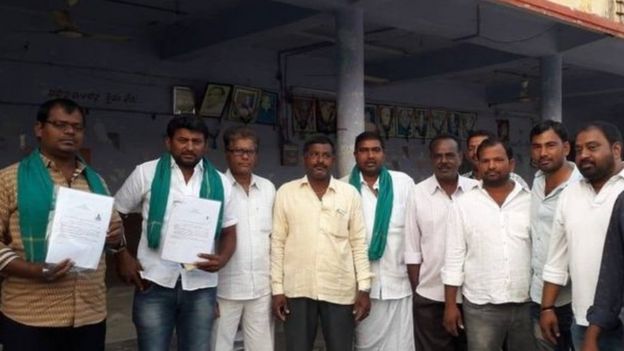 Image copyrightBBC TELUGU
Image copyrightBBC TELUGUThey are contesting as independents from Nizamabad, a seat they chose so they could run against Kalvakuntla Kavitha, who is the sitting MP and daughter of the state’s chief minister K Chandrasekhar Rao.
Why does this matter?
It shows how India’s deepening agrarian crisis has become a crucial issue in this year’s election.
In recent years, farmers across the country have staged large and at times dramatic protests to draw attention to their plight. Agriculture has been adversely affected by a depleting water table and declining productivity, which has meant that many farmers have been caught up in a massive debt trap.
Nizamabad’s farmers, for instance, say they have been demanding higher crop prices – which are set by the federal government – for years now. They told BBC Telugu that they were promised price increases during the last election but the government has not delivered.
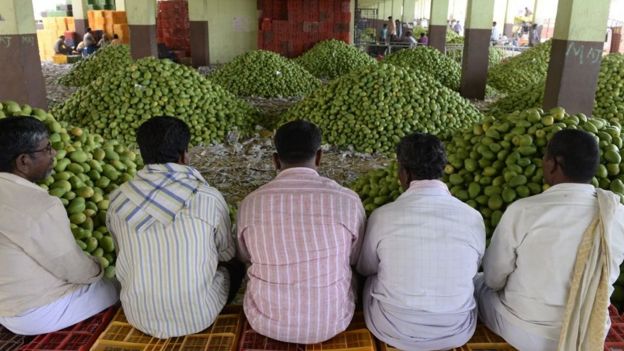 Image copyrightGETTY IMAGES
Image copyrightGETTY IMAGES“No matter how much we protested, we did not receive a response,” says Venkatesh Kola, a farmer from the village of Armoor, who will be one of those running against Ms Kavitha.
He said they decided to run against Ms Kavitha because she had personally “vowed” that she would not seek their votes again if she did not fulfil their demands. And yet, he added, she was still contesting the election this year.
Mr Kola also said that more farmers had been planning to run as candidates but had been pressured not to by local political leaders.
It is likely that not all of the farmers will end up on the ballot – once filed, nomination forms have to be approved by the election commission.
But as a form of protest, it is still significant.
Ms Kavitha has alleged that the farmers are proxy candidates, propped up by the two national parties – BJP and Congress.

BJP hits back at Congress’ income scheme
What happened?
Finance minister Arun Jaitley has slammed the main opposition Congress party after its leader Rahul Gandhi pledged to create “the world’s largest minimum income scheme” if his party wins the election.
“A party with such a terrible track record of poverty alleviation has no right to make lofty assurances,” Mr Jaitley told reporters on Monday evening, adding that it was a “bluff announcement”.
Why does this matter?
The scheme, which guarantees a basic income for 50 million of India’s poorest families, is Congress’ biggest offering to voters so far.
The Congress first mentioned an income scheme in January amid rumours that the government was preparing to unveil a similar programme.
That never happened. So, Mr Gandhi’s announcement was seen by some, including activist Prashant Bhushan, as the Congress beating the BJP to the punch.
Given the scale of the scheme, it is likely to capture the imagination of voters -which could be a threat to the BJP.
Mr Jaitley took to social media on Monday, where he posted a lengthy response, outlining how the BJP has supported the poor while attacking the Congress’ policies.
“No political party has betrayed India for more than seven decades other than the Congress Party,” he wrote in a Facebook post.
Other ministers also joined the attack.
“This showing of false dream to the people of India, is not going to cut any ice because the Congress record of 55 years has always been anti-poor,” information minister Ravi Shankar Prasad told local media.
French economist Thomas Piketty, noted for his work on income inequality, told the BBC he supports “all efforts to reduce income inequality in India” and “to move away the political debate from caste-based political to class-based redistribution of income and wealth.”
But some Indian economists have questioned the preference for targeted schemes over universal ones.


On Monday… the battle for UP got ugly
What happened?
It was the last day for political parties to hand in their nominations for the first phase of voting that begins 11 April. And campaigning has started in earnest, warts and all.
In the politically crucial state of Uttar Pradesh, the chief minister, firebrand Hindu monk Yogi Adityanath, referred to one of the opposition Congress party candidates – a Muslim named Imran Masood – as the “son-in-law” of militant Masood Azhar.
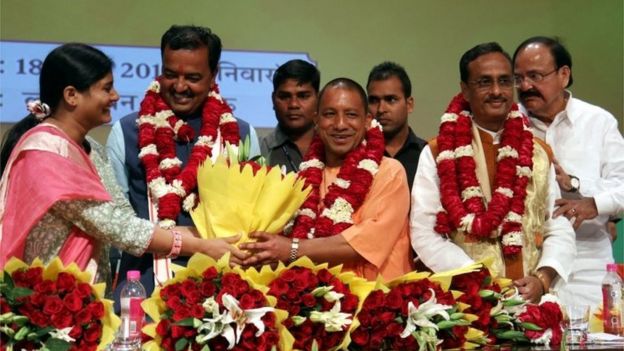 Image copyrightAFP
Image copyrightAFPAzhar is the Pakistani-based founder of the militant group Jaish-e-Mohammad, which in February carried out a suicide attack in Indian-administered Kashmir that killed 40 troops and sparked tit-for-tat strikes between India and Pakistan.
Why does this matter?
Mr Adityanath’s comments indicate what tone the campaigning is going to take in the days leading up to voting in Uttar Pradesh, which sends the most number of MPs to parliament
However, Imran Masood is also a controversial figure. He was arrested in 2014 after a speech in which he threatened Mr Modi, saying he would “cut him into pieces”.
“Saharanpur [constituency] also has the son-in-law of Azhar Masood, who speaks in his language. You have to decide whether you will elect a person who speaks in Azhar Masood’s language or Modi-ji’s lieutenant in Raghav Lakhanpal, who will ensure development for all,” Yogi Adityanath said at a rally on Sunday.
In 2014, the Bharatiya Janata Party (BJP), of which Mr Adityanath is a member, swept Uttar Pradesh with what political commentators described as a clever mix of communal division and promises of development.
Mr Adityanath seems to be following a similar formula this time around.
In the wake of the Kashmir suicide attack a tough stance on Pakistan has become a major theme of the BJP’s campaign. On Sunday India’s foreign minister Sushma Swaraj had a Twitter spat with Pakistan’s information minister over a news report that two Hindu girls had been abducted and forcibly married off in Pakistan.

